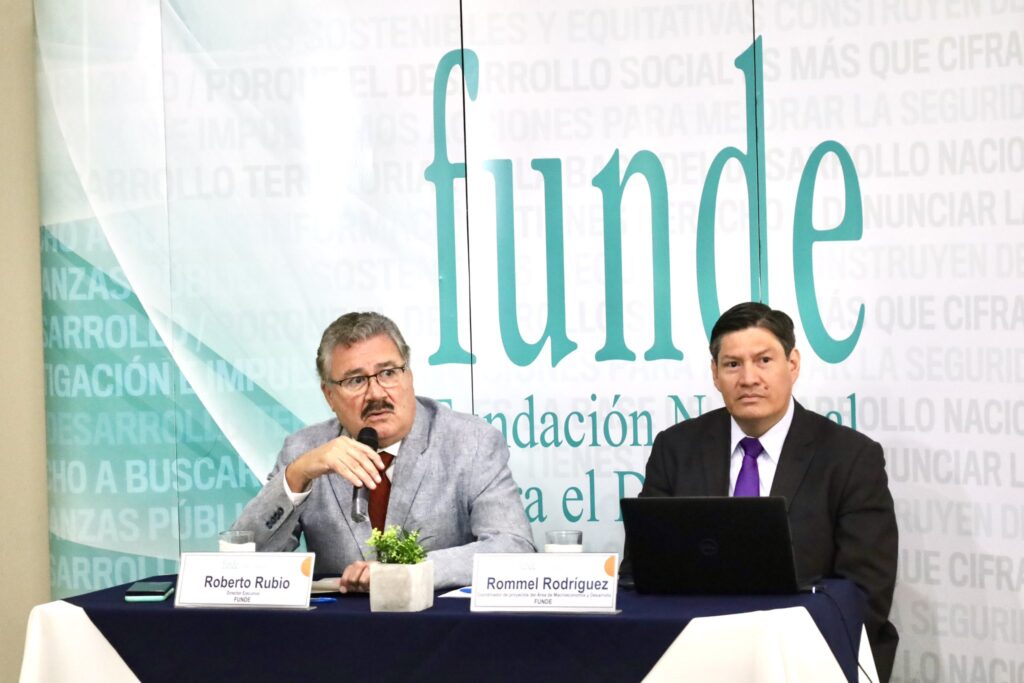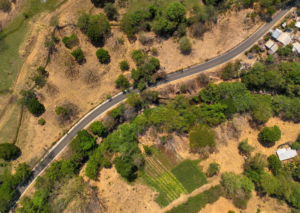
The Fundación Nacional para el Desarrollo (FUNDE), through its Macroeconomics and Development area, has presented its Report on the Economic Situation of El Salvador, highlighting a mixed outlook for 2023 and prospects for 2024 and 2025.
The salvadoran economy has shown signs of slowing down in 2024. The Índice de Volumen de Actividad Económica (IVAE) reveals a decrease of -0.62% in april 2024, compared to a growth of 4.24% in april 2023. This decline is mainly due to the contraction of the construction sector, which decreased by 16.79% in April 2024 after having grown by 26.56% in the same month of the previous year.
The industrial sector shows a slight recovery with an increase of 0.4% in april 2024, in contrast to a drop of -0.54% in april 2023. However, other sectors such as professional services and public administration have registered contractions of -3.25% and -3.29%, respectively.

Gross Domestic Product (GDP) for the first quarter of 2024 grew by 2.2%, lower than the 4.35% recorded in the fourth quarter of 2023. Economic growth for the full year 2024 is expected to remain between 3.0% and 3.5%, according to the BCR and the International Monetary Fund (IMF).
Inflation has been a persistent challenge. In june 2024, the rate of change of the Consumer Price Index (CPI) was 1.48%, down from 3.78% in june 2023. However, core inflation has increased again since april of this year, reflecting the impact of seasonal and weather factors on food prices.
The Multipurpose Household Survey determined that the average salary in El Salvador in 2023 was US$407.92 dollars, which with respect to 2022 indicates an increase of only US$30.06 dollars, which does not compensate for the increase in the cost of the basic food basket. Thus, for example, an average salary in 2022 would allow purchasing 1.66 times the basic food basket in urban areas and 2.31 times the basic food basket in rural areas, but by 2023, this ratio deteriorates to 1.64 times the basic urban basket and 2.16 times the basic rural basket.
In the external sector, remittances, a vital source of income for salvadoran families, totaled US$3,390.4 million in May 2024, an increase of 1.76% over the same period last year. However, this growth is lower compared to previous years.
The trade balance has shown a growing deficit, reaching US$3,872.8 million in may 2024. Exports fell to US$2,699.08 million, while imports increased to US$6.57 billion.
Imports increased to US$6,571.88 million. This deficit is attributed in part to the slowdown in world demand and international competition. The maquila sector, which is fundamental for exports, has suffered a significant decline, with a 17% drop in may 2024 compared to the previous year.
The banking sector has shown resilience despite the economic challenges. Financial activities grew by 10.11% in april 2024, driven by an increase in loans and deposits. However, the sector faces risks associated with high inflation and the global economic slowdown.

In terms of public finances, public spending has played a crucial role in sustaining the economy. Increased public investment, especially in infrastructure, has boosted sectors such as construction. Nevertheless, the fiscal deficit remains a concern, exacerbated by high levels of public indebtedness.
Tax collection has shown improvement, but remains insufficient to cover growing public spending. Long-term fiscal sustainability will require fiscal adjustment measures and comprehensive tax reform to increase state revenues.
Total spending is unstoppable. According to the economic classification, consumption, interest and gross investment expenditure items show a considerable increase, but curiously, spending oriented towards third parties and the private sector has been reduced: spending on current transfers -which includes subsidies and some transfers to the private sector- as well as capital transfers, which are resources previously provided by the government to municipalities for public investment (75% of the now defunct FODES).
The report highlights the challenges for the salvadoran economy in 2024. Slowing economic growth and persistent inflation require a coordinated public policy response. Remittances and public investment will remain important pillars, while the banking sector will need to manage risks associated with the global economy. The focus on fiscal sustainability will be crucial to ensure long-term economic stability. It is expected, according to projections by international agencies, that the country will grow by 3.0% and close with inflation close to 1.0% in 2024. As of may there are signs of a slowdown in the economy so the expected growth may be lower.







